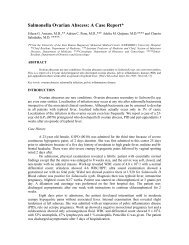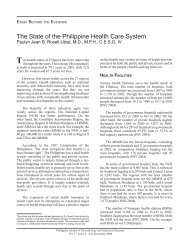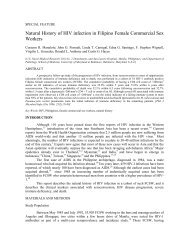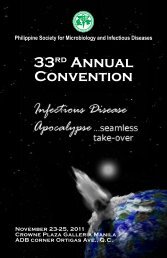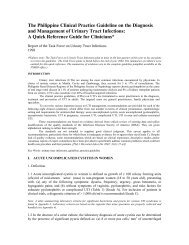Nifuroxazide (Ercefuryl) Plus Oral rehydration solution Versus Oral ...
Nifuroxazide (Ercefuryl) Plus Oral rehydration solution Versus Oral ...
Nifuroxazide (Ercefuryl) Plus Oral rehydration solution Versus Oral ...
You also want an ePaper? Increase the reach of your titles
YUMPU automatically turns print PDFs into web optimized ePapers that Google loves.
Table 5. Bacterial Pathogens Isolated<br />
Pathogens <strong>Ercefuryl</strong> ORS<br />
Shigella 7 8<br />
Salmonella 3 3<br />
Vibrio cholerae 4 3<br />
Toxigenic E. co1i 3 2<br />
Enteropathogenic E. coli 1 2<br />
Vibrio parahemolyticus 1 2<br />
Vibrio fluvialis 1 0<br />
Total patients 20 20<br />
DISCUSSION<br />
Since our intention in doing this study was to determine whether the addition of an oral<br />
anti-infectious agent to the usual <strong>rehydration</strong> and diet therapy was of therapeutic value in the<br />
diarrheas of infants and children, we were very careful and critical in our interpretations. We<br />
know that many researchers consider ORS to be sufficient in combating dehydration to which we<br />
agree but since we wanted to shorten the patient's stay in the hospital we think that an antiinfectious<br />
agent is necessary, as seen in our results. The duration of illness is very important in<br />
any government hospital. A decrease in the duration of the illness of the patient would mean a<br />
shorter hospital stay which is advantageous psychologically and economically. Looking at our<br />
results it is clear that the drug led to considerable improvement in the patient's symptomatology<br />
and well-being. However, because the major problem is still the risk of dehydration, we think that<br />
ORS should be a part of the drug treatment in infectious diarrhea.<br />
In this study, we also put importance to the proper supervision of the patient's diet<br />
because maintenance of adequate nutrition will prevent malnutrition, a condition that can hinder<br />
early response of the patient. 11,12 Nutrition can be maintained because the gut remains able to<br />
absorb a variety of nutrients. In fact, there is no physiological basis to the common belief that the<br />
bowel should be "rested" during acute diarrhea.<br />
Because we had done this study to hospitalized patients, we cannot say whether the<br />
results would be the same for outpatients since usually only the mild and moderately dehydrated<br />
cases are the ones treated in the Out-Patient Department, in which cases ORS alone is enough to<br />
relieve the dehydration.<br />
CONCLUSION<br />
In conclusion, we think the drug has a therapeutic value especially when given<br />
concomitant with an oral <strong>rehydration</strong> <strong>solution</strong>. In addition to the drug and flu id therapy, the diet<br />
of the patient should be properly guided to reach maximum therapeutic level.<br />
No side effects or reactions were noted from the nifuroxazide patients.<br />
Acknowledgement<br />
We wish to thank Laboratories Robert & Carriere for supplying the drugs used for this trial.<br />
REFERENCES<br />
1. Darrow DC. Disturbances of water and electrolytes in infantile diarrhea. Pediatrics 1949; 3(2):129-132,.<br />
2. Pierce NF, Hirschhorn N. <strong>Oral</strong> fluid - A simple weapon against dehydration diarrhea. WHO Chronicle 1977; 31:87-93.<br />
3. Cash RA. Treatment of acute diarrhea - Emphasis on oral therapy. Excerpts from Chronicles 1981I(I).<br />
4. Santoshara M, et al. <strong>Oral</strong> <strong>rehydration</strong> therapy of infantile diarrhea. N Engl J Med 1982; 306:1070-1076.<br />
5. Christie AB. Infectious Diseases Epidemiology and Clinical Practice. 2nd Edition, Churchill Livingstone. 1974. pp. 42-45.



